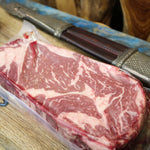
Chapter 7: Limousin
In the sun-drenched landscapes of France, where rolling hills embrace the art of efficient feed conversion, Limousin cattle graze—a breed that epitomizes lean elegance and sustainable agriculture. With their golden-red coats and efficient feed utilization, Limousins stand as champions of efficiency in meat production, blending French savoir-faire with a commitment to responsible farming practices.
Origins and Golden Hues:
Originating from the Limousin and Marche regions of France, Limousin cattle have a history intertwined with the pastoral landscapes of the French countryside. The breed's golden-red coat, a distinctive characteristic, is not merely a visual delight but also a practical feature, reflecting the sunlight and minimizing heat stress—a testament to the breed's adaptation to warmer climates.
Lean Efficiency: The Limousin Advantage:
Limousin cattle are renowned for their efficiency in converting feed into lean muscle. This efficiency is a result of centuries of selective breeding, honing traits that contribute to the breed's economic significance in meat production. Limousin beef, celebrated for its leanness and high meat-to-bone ratio, aligns with modern preferences for healthier, leaner cuts.
The breed's ability to efficiently convert forage into quality beef has positioned Limousin as a choice breed for sustainable and environmentally conscious farming practices. Limousin cattle thrive on forages and can contribute to pasture-based systems, promoting a more ecologically friendly approach to beef production.
French Excellence in Culinary Sustainability:
Limousin beef, with its sustainable and lean profile, reflects the commitment of French farmers to environmentally responsible agriculture. The breed's ability to thrive on grass-based diets aligns with the principles of pasture-centric farming, contributing to the reduction of the environmental footprint associated with beef production.
The French excellence in culinary sustainability goes beyond the pasture. Limousin beef, with its naturally lean characteristics, offers a healthier option for consumers without compromising on flavor. The meat's tenderness and distinct taste make it a versatile ingredient in a variety of culinary creations, from classic French dishes to modern, health-conscious recipes.
Efficiency Meets Maternal Excellence:
Limousin cattle aren't just efficient in meat production; they also showcase maternal excellence. Limousin cows are known for their fertility and ease of calving, contributing to their role in crossbreeding programs aimed at improving overall herd performance. The breed's adaptability to different management systems further enhances its appeal to cattle producers seeking versatile and hardy genetics.
Limousin Globally: From French Fields to International Frontiers:
The Limousin breed, born in the picturesque French landscapes, has traveled far and wide. From the green pastures of France to the ranches of North America and beyond, Limousin cattle have become ambassadors of efficient, sustainable, and high-quality beef production.
The global influence of Limousin genetics has permeated the beef industry, with the breed contributing to the enhancement of herds worldwide. Limousin's adaptability and genetic excellence continue to make it a valuable asset to cattle producers seeking a balance between efficiency, sustainability, and culinary quality.
Conclusion: Limousin—A Golden Thread in the Tapestry of French Agriculture:
As Limousin cattle graze in the golden fields of France and beyond, they weave a narrative that goes beyond beef production. They represent a golden thread in the tapestry of French agriculture—a story of efficiency, sustainability, and a commitment to producing lean and flavorful beef. From the sunlit hills of Limousin to the global stage, the breed stands as a symbol of French agricultural savoir-faire, contributing to a culinary legacy that values both taste and responsibility.



